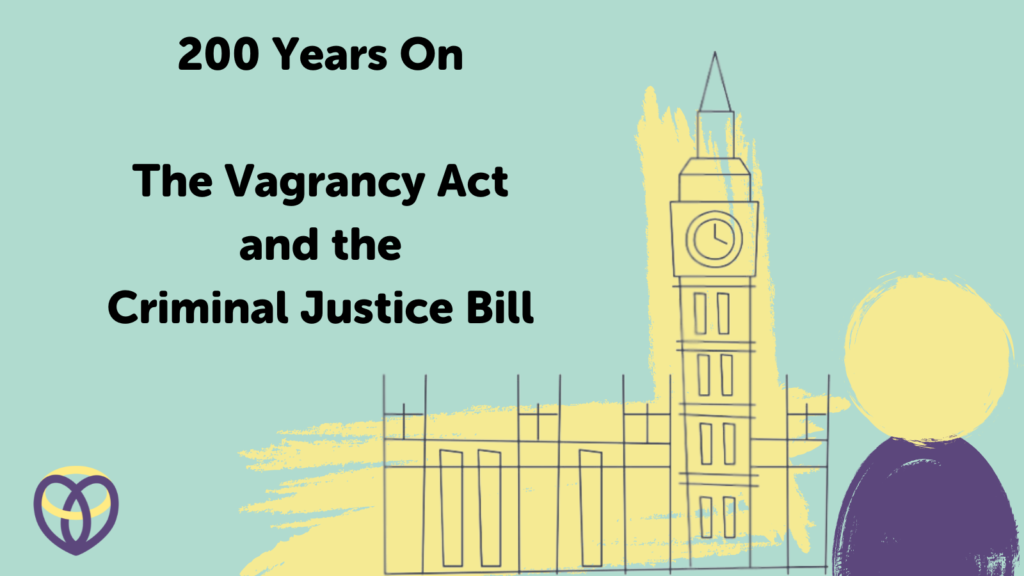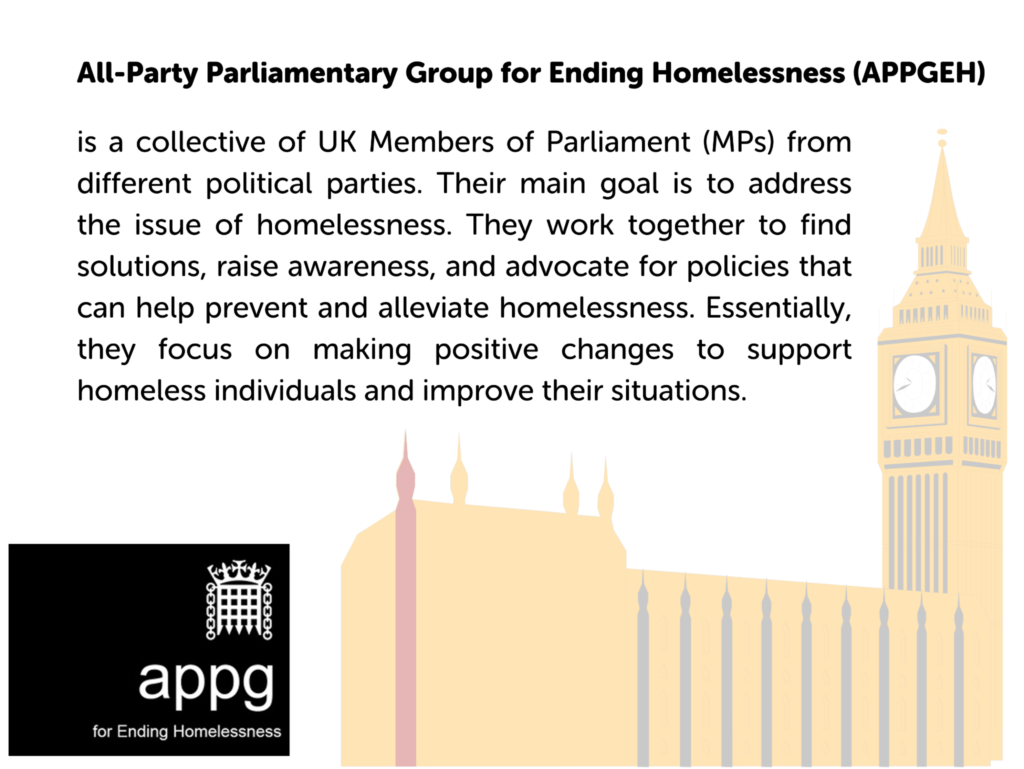
On Tuesday 12 March the All-Party Parliamentary Group for Ending Homelessness (APPGEH) held a meeting in Parliament to discuss the impact of the current draft of the government’s proposed Criminal Justice Bill.
At the meeting, chaired by MPs, Bob Blackman and Paula Barker, were a panel of experts including people from local authorities and people with lived experience of homelessness.

Why did they meet and what are the main concerns about the proposed bill as it stands?
So, back in 1824, the government passed a law known as the Vagrancy Act. This is a piece of legislation in England and Wales that makes it a criminal offence to beg or be homeless on the street. The main reason it was passed was to try and tackle the problem behaviour of “idle and disorderly persons”, as they phrased it.
The issue that homelessness charities have with this law is that criminalising homelessness does not address the causes of homelessness in the first place, and it is penalising someone for being in a situation that is due to inadequate prevention, support, and opportunities, rather than choices they have freely made.

In 2019 Crisis, the national homelessness charity, launched a campaign called “Scrap the Act” and produced a report in collaboration with campaign partners, exploring the case for repealing this archaic act, which is now 200 years old.

In 2022, following this national campaign and petition, the government agreed to repeal the Vagrancy Act. It was a win, however, since then, the government has yet to enact this decision, and so the act is technically still in force and the government has been looking at ways to replace this legislation via The Criminal Justice Bill.
This could mean that people potentially face fines of up to £2500 or be imprisoned just for being homeless. This would make the prospect of recovery and move-on from rough sleeping extremely difficult, and it fails to uphold the dignity of the person or recognise that they are victims of an unfair and inequitable system.
|| Poverty pushes people into homelessness,
so this will only make it harder for people
to access the support they need. ||
The APPG are working together to ask the government to remove the aspects of the draft bill that will, in practice, criminalise homelessness and are urging politicians across all parties to support this.
The APPG disputes the suggestion in the bill that people experiencing street homelessness and seeking the safety that bedding down in a doorway can bring are a nuisance. They want the government to reframe their view on homelessness and bring in legislation that is compassionate and seeks to resolve someone’s homelessness situation rather than exacerbate it.
Andy Rouke is a member of staff at Crisis and is based at their office in Birmingham. Andy attended the APPG as he also is someone with a lived experience of rough sleeping, and knows first hand the risks and vulnerabilities people face and the impact that the Vagrancy Act has had.

Andy became street homeless when he was just 14 years old as it was safer for him to sleep rough on the streets than stay at his family home. While homeless Andy experienced trauma, stigma and cruelty. He shared at the meeting about the degrading treatment he received from members of the public and how he had been arrested just for being on the street.
Andy shared with Street Support Network his thoughts and reflections on the day:
“On Tuesday 12th March 2024, I was invited to be a panellist on the All-Party Parliamentary Group (APPG) – being held at the Houses of Parliament. I was honoured to have been asked, and I was both nervous and proud, as the date of the event came closer”.
“Given my personal history, it is fair to say that there were times when I wouldn’t have ever believed that I could be invited to such an event – the main focus that I had was to try to impress upon all of those listening the importance of treating those affected by homelessness with dignity and respect – although, to be honest, to even have to make such a point seemed strange to me”.
“The night before the meeting I was nervous and excited, and I ensured that I practised my speech thoroughly. I had practised it with both Noosh and Rosie, from Crisis, and I was confident that I would be able to say all the things that I wanted to”
“On the day of the speech, we arrived at Parliament in plenty of time, eventually being taken through to the room where the meeting was to take place – it was impressive! I met with Paula Barker and Bob Blackman, two MP’s that have helped Crisis with addressing homelessness within the Commons. Paula and Bob were both really nice, and they took the time to explain the processes and procedures to me. Soon enough it was my turn to speak, and the time flew by – before I knew it, I had finished my speech and was taking questions.”

“After the meeting, we filmed the video that would later be posted by Crisis across its Social Media accounts – in itself, a wonderful experience!”
“Overall, it has been a very rewarding experience and one which I hope to do again – the feedback that I have received, both from within, and external to, the Organisation, has been positive and I am hopeful that the speech, video and event will have had the impacts that we all hope they would have”
Call to action
You can lend your voice to the campaign to ensure that people experiencing homelessness on the street are not treated as criminals, but to be treated with compassion and for the government to lead the way in changing systems that led to them being there in the first place.
Click here to be taken to the Crisis UK campaign webpage to see how you can help
